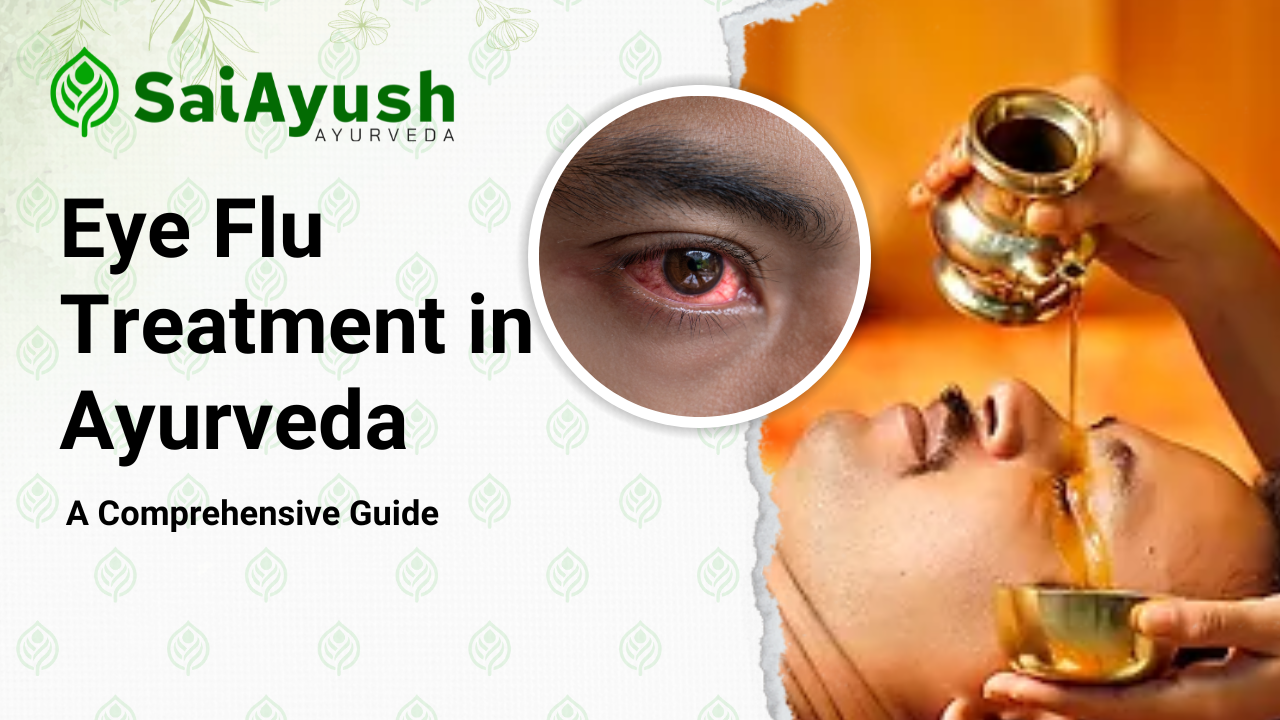When I think about holistic and natural ways to tackle health issues, Ayurveda always comes to mind. Recently, many have been seeking remedies for eye flu, a common yet uncomfortable condition. In this blog post, I will explore eye flu symptoms and treatment in Ayurveda, offering insights into how this ancient system of medicine can provide relief. Let’s dive into the world of Ayurveda and discover how it can help manage eye flu.
What is Eye Flu?
Eye flu, also known as conjunctivitis, is an inflammation of the conjunctiva, the thin layer that covers the white part of the eye and the inside of the eyelids. It is often caused by bacterial or viral infections, allergens, or irritants.
Common Symptoms of Eye Flu:
- Redness in the eyes
- Itching and irritation
- Watery eyes or discharge
- Swollen eyelids
- Sensitivity to light
Understanding Eye Flu in Ayurveda
In Ayurveda, eye flu is referred to as “Abhishyanda.” According to Ayurvedic principles, it occurs due to an imbalance in the doshas—primarily Pitta and Kapha. This imbalance leads to the accumulation of toxins (ama) in the eyes, causing inflammation and discomfort.
Ayurvedic Approach to Eye Flu Treatment
Ayurvedic Remedies for Eye Flu
One of the remarkable aspects of Ayurveda is its holistic approach to treatment, which includes herbal remedies, dietary adjustments, and lifestyle changes. Here are some Ayurvedic treatments for eye flu: Triphala Eyewash: Triphala, a blend of three fruits (Haritaki, Bibhitaki, and Amalaki), is renowned for its healing properties. Preparing an eyewash with Triphala powder can help soothe irritated eyes and reduce inflammation. Neem (Azadirachta indica): Neem leaves have powerful antibacterial and antiviral properties. Boiling neem leaves and using the cooled water as an eyewash can help in reducing infection and soothing the eyes. Rose Water: Rose water is known for its cooling and soothing properties. Applying rose water to the eyes with a cotton pad can provide immediate relief from irritation and redness. Coriander Seed Water: Coriander seeds have anti-inflammatory properties. Boiling coriander seeds in water and using the strained liquid as an eyewash can help alleviate symptoms of eye flu. Aloe Vera Gel: Applying a small amount of aloe vera gel around the eyes can help reduce inflammation and provide a cooling effect.
Dietary Recommendations
In Ayurveda, diet plays a crucial role in managing health conditions. To combat eye flu, it’s essential to consume foods that balance Pitta and Kapha doshas. Here are some dietary tips:
- Include cooling foods: Cucumbers, melons, and leafy greens can help balance Pitta.
- Hydration: Drinking plenty of water and herbal teas can flush out toxins.
- Avoid spicy and oily foods: These can aggravate Pitta and worsen symptoms.
- Include turmeric: Known for its anti-inflammatory properties, turmeric can be added to meals for added benefits.
Lifestyle and Preventive Measures
Ayurveda emphasizes the importance of lifestyle changes in managing health conditions. Here are some lifestyle tips to prevent and manage eye flu:
- Maintain hygiene: Wash your hands regularly and avoid touching your eyes.
- Use clean towels and pillowcases: Change these regularly to prevent infection.
- Avoid allergens: Identify and avoid potential allergens that could trigger eye flu.
- Stay hydrated: Drinking adequate water helps flush out toxins from the body.
- Practice eye exercises: Simple eye exercises can improve blood circulation and reduce strain.
FAQs
About Eye Flu Treatment in Ayurveda
Q: What is the best Ayurvedic remedy for eye flu?
A:The best Ayurvedic remedy for eye flu includes using Triphala eyewash, rose water, and neem leaf water, all of which have soothing and anti-inflammatory properties.
Q: How long does it take for Ayurvedic treatments to work for eye flu?
A:The duration can vary, but many people experience relief within a few days of consistent treatment. However, it is recommended to continue the treatment for at least a week for complete recovery.
Q: Can diet help in managing eye flu?
A:Yes, following a Pitta and Kapha balancing diet can help manage the symptoms and prevent the recurrence of eye flu.
Q: Are there any side effects of Ayurvedic treatments for eye flu?
C Ayurvedic treatments are generally safe and have minimal side effects. However, it is always advisable to consult an Ayurvedic practitioner before starting any treatment.
Q: Can eye flu be prevented through Ayurveda?
A: Yes, maintaining good hygiene, following a balanced diet, and using preventive measures like regular eyewashes with Triphala or rose water can help prevent eye flu. Ayurveda offers a wealth of knowledge and natural remedies to treat eye flu effectively. By understanding the underlying causes and following the holistic approaches outlined above, one can manage and even prevent eye flu. Remember, it’s essential to maintain good hygiene, follow a balanced diet, and consult with an Ayurvedic practitioner for personalized advice. Let’s embrace these natural methods to keep our eyes healthy and free from infections.
Discover the healing power of Ayurveda with our latest article at Sai Ayush Ayurveda Hospitals! Dive into the age-old wisdom that can rejuvenate your body and mind. Click here to read more:



0 Comments